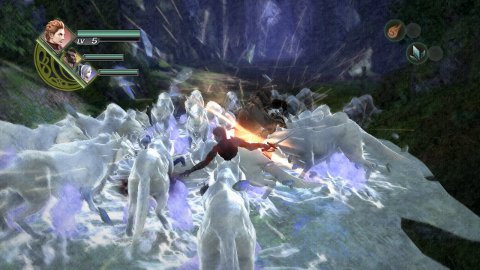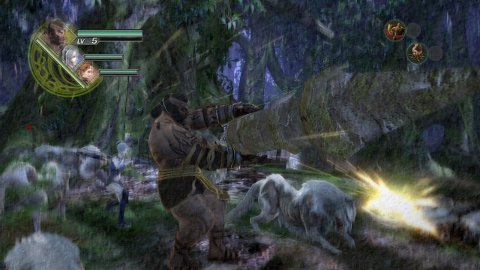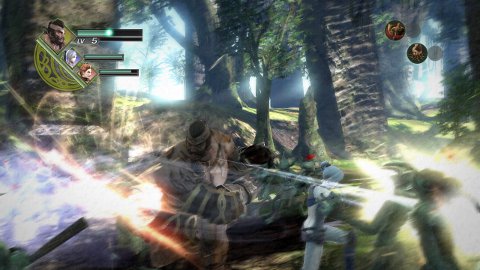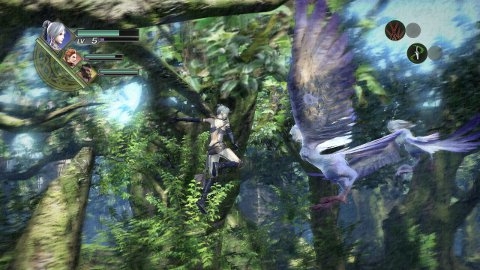Tecmo Koei is usually known for their hack and slashers, such as the recent Fist of the North Star: Ken's Rage. Trinity: Souls of Zill O'll is a slight departure from this, adding in RPG elements to Tecmo Koei's usual style. So the question is: is there an RPG in my hack-and-slasher or a hack-and-slasher in my RPG?
The game stars three main characters; Areus, the half elf protagonist who is destined to kill his grandfather, evil lord Balor; Dadga, a well built adventurer who join players for the thrill of a good quest; and Selene, the mysterious, independent assassin who joins players, despite an apathetic attitude. Trinity's selling point is that players can switch between these three at any time. This works out pretty well for the most part, because every character has specific abilities that others lack. When needed, Areus can change the terrain with his magic, while Dadga can destroy some barriers and Selene is agile enough to reach areas the others can't.

While it takes a while for the game’s customization options to open up, once it does, players will have access to three sets of abilities per characters, all of which can be upgraded and mixed with each other. Each is also mapped to a different face button, so players can access different abilities instantly throughout fights. Different abilities are more effective against different enemies and players will find themselves constantly changing up their attacks to adapt to their foes. Some of these may be obvious, such as the fire-spitting griffin’s ice weakness, but others may take a little more guess work and experimentation. This is the kind of gameplay element that isn’t in most hack-and-slashers, but was able to be included in Trinity because of its RPG elements.
Graphically, this is one of Tecmo Koei’s better looking games. The levels cover a wide array of terrains that games like Dynasty Warriors wouldn’t be able to showcase. The forests are filled with vibrant trees and aged structures; the fantasy settings have interesting touches like giant mushrooms that spew out poisonous gases; seeing such variety in a Tecmo Koei game was surprising and definitely beat the monotonous plains sprinkled with trees and enemy bases found in the Warriors series.

Travel in Trinity’s world takes place through a map where players simply pick locations to travel to. For the most part, it’s pretty straightforward, with notices pointing to areas if a quest is located there. However, if players ever miss part of the story or dialogue and have no idea where to head, they’re pretty much out of luck. There were several instances where I found myself revisiting almost every town and talking to every character possible, just to see if I had missed something; eventually, I stumbled on the right area of town to head towards, which another character had told me to go to, but I missed because I was too busy skipping the game’s story.
While that generally doesn’t happen in most RPGs, Trinity’s story was a bit too cliché and delivered a bit too blandly for my tastes. As mentioned, a prophecy stated that Emperor Balor will be killed by his grandson, Areus. This sounds a bit too much like Oedipus, except Oedipus killed his father and not grandfather. That’s already enough to numb me from the story. To make matters worse, most of the story is told through bland dialogue boxes and character portraits, not unlike most visual novel games. Combine that with the hordes of random townsfolk that will talk to players on random occasions on any miniscule achievement, such as freezing a certain amount of enemies or slaying enough bats, and I found myself skipping almost all the dialogue within the game.

Trinity is a welcome addition to any hack-and-slash fans’ library. It adds enough RPG elements so that they will no longer only mash on several buttons. RPG fans may be drawn to it as well, because the hack-and-slash mechanics are definitely more fun than most action RPGs; nothing beats the pleasure of mowing down a crowd of enemies. The narrative is a bit lacking, but it doesn’t drag the game down too much. Both Warriors series fans and RPG fans alike should give this unique hybrid a chance. And to answer the question posed earlier, it’s “two great genres that mix great together.”

